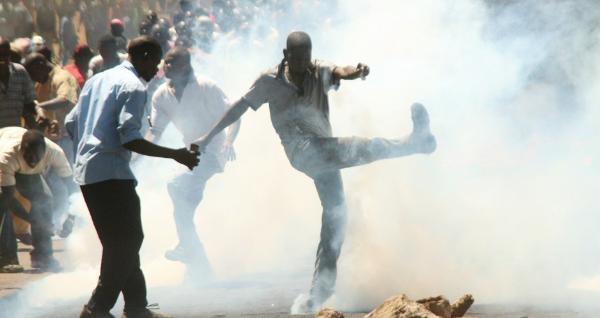Attempts are underway to broker an agreement in Kenya after the shocking outbreak of communal violence which followed the recent disputed elections. Elias Omondi SJ of the Jesuit Hakimani Centre in Nairobi warns that time is running out for a country in danger of being torn apart.
The mediation process led by Kofi Annan, former UN Secretary General, is underway, raising hopes that the Kenyan post-election crisis could be ended soon. However, agreement over a fundamental political settlement over the disputed elections will be the determining factor this week which will eventually guarantee peace or more crisis. It is time to make serious compromises at the negotiation table in order to save this country. We are faced with a civil war and something ought to be done immediately by our leaders. More than 800 people have died and 400,000 displaced. We have attained more than 95% of all indicators that a country needs to be in a state of internal conflict. The proportions could be minimal compared to other African countries that have known conflict, but life is sacred and ought to be defended at all times. In fact, the current conflict in Kenya has taken a completely different dimension. The illusion for many Kenyans in the cities, especially in Nairobi, is that the current ethnic violence being witnessed in Rift Valley, Nakuru, Naivasha and some slums in Nairobi is about the post-election dispute. We have already been surpassed by events. The depth of the ethnic violence is such that it will take up to 40 years to heal this country. This is the time we need leadership and prophetic voices in the country – from politicians, civil society, religious leaders and youth.
But despite the violence, we have heard amazing stories of how individuals and families across the ethnic and political divide have shown solidarity, shared their minimal resources and bridged the divisions. These stories have not featured much in the media but they remain a true witness of hope for the future of the country.
The security forces have been so disappointing in quelling down the skirmishes since 30 December 2007. How can a whole province be ruled by armed militias, killing people and destroying property, not for hours or days but for weeks, and yet the security forces in this country continue to look on while sending minimum number of police to calm down the situation?!
Why should the two opposing parties fight to rule a country so divided and disintegrated? It is time that both the Raila and Kibaki camps realize that the country is already in a civil war and their power games at the mediation table should not take any longer than necessary. Sacrifices will have to be made in the quest for power in order to keep this country together. There is so much suffering, some of which has been expressed in the media and some not. For example, there are villages that have been burnt down in Kitale and yet hardly talked about. The current divisions and inter-ethnic conflicts and revenge will certainly continue unless there are serious measures taken to face the situation on the ground. The immediate priority is to bring the country together. This country is falling apart.
The desperate calls for peace have been drowned or complemented by similar calls for justice. But we ought to know that these two are complementary and not opposed to each other. The search for peace should not compromise justice, nor should the quest for justice employ unjust means that cause more injustices. Peace ought to be understood in a more comprehensive manner. It entails a state where there is harmony in people’s lives and relationships at the social, economic, political and religious levels. It is clearly understood that the current calls for peace demand the immediate stoppage of the inhuman killings going on in the Rift Valley, Nakuru, Limuru and some parts of Nairobi.
On the other hand the call for justice is in three dimensions. Firstly, there is the settlement of the election dispute through a mediation process that calls for statesmanship and visionary leadership. The justice measure here is the good of the country and a “win-win” compromise. This process is representative in that it is not only about the Kibaki and Raila camps but equally about the electorate from both sides. The second level of justice focuses on those who have lost their lives and property. Every Kenyan has a right to security and ownership of property in any part of this country. Those whose family members have been killed or have lost their property have a right to compensation or reclamation of their property. The third level of justice is a right to citizenship. It is unjust to be forced into an ethnic cage and to have one’s identity limited to an ethnic affiliation. Many people have been discriminated against on the basis of their ethnic identity. This has led to ethnic cleansing in several parts of Kenya and has spread into places of work as well as living quarters, where landlords force out tenants because of their ethnic identity. The justice measure here is that Kenyan identity is bigger than ethnic identity, and this country belongs to all of us.
I have worked in many African countries in conflict, and it is evident that most conflicts mutate into various levels and, as time advances, the primary reason of the conflict can change and the driving force behind it take a completely different turn. If you ask a person from Somalia what the current conflict is about you will never get a comprehensive answer. This is because the conflict has taken on so many dimensions since the fall of Siad Barre in 1991. Similarly the conflict in Ivory Coast which broke out due to a poorly-managed election process has mutated to various levels, leading to the division of the country into two.
The more the conflict degenerates, the more players come into play, and the more the objective is distorted. The Kenyan conflict is gradually mutating and the talks at the mediation table ought to be focused on a process that will keep Kenya as one. Time is running out, and in the next one month I don’t know whether I will be talking of a country named Kenya or a country that was once Kenya. Can we bridge our ethnic sentiments and pull this country together, right from our families, communities, places of work and positions of authority?
Elias Omondi SJ is a conflict analyst and director of the Jesuit Hakimani Centre in Nairobi, the social justice centre of the Jesuits in Eastern Africa. This article was originally published in the e-newsletter of the Hakimani Centre, and we are grateful to the Editor for permission to reproduce it here.
![]() The Jesuit Hakimani Centre, Nairobi
The Jesuit Hakimani Centre, Nairobi
![]() The e-newsletter of the Hakimani Centre
The e-newsletter of the Hakimani Centre






